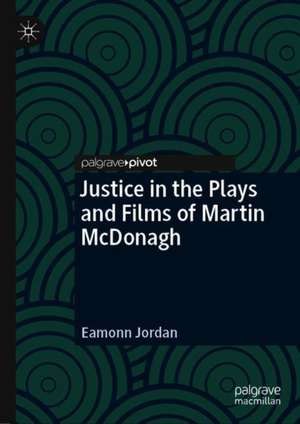Justice in the Plays and Films of Martin McDonagh
Autor Eamonn Jordanen Limba Engleză Hardback – 20 noi 2019
Preț: 418.07 lei
Nou
Puncte Express: 627
Preț estimativ în valută:
79.100€ • 83.52$ • 66.21£
79.100€ • 83.52$ • 66.21£
Carte tipărită la comandă
Livrare economică 04-18 aprilie
Preluare comenzi: 021 569.72.76
Specificații
ISBN-13: 9783030304522
ISBN-10: 3030304523
Pagini: 133
Ilustrații: IX, 145 p. 1 illus.
Dimensiuni: 148 x 210 mm
Greutate: 0.34 kg
Ediția:1st ed. 2019
Editura: Springer International Publishing
Colecția Palgrave Pivot
Locul publicării:Cham, Switzerland
ISBN-10: 3030304523
Pagini: 133
Ilustrații: IX, 145 p. 1 illus.
Dimensiuni: 148 x 210 mm
Greutate: 0.34 kg
Ediția:1st ed. 2019
Editura: Springer International Publishing
Colecția Palgrave Pivot
Locul publicării:Cham, Switzerland
Cuprins
Introduction: Beware of Justice.- 1. CSI Connemara and State Incompetence: The Beauty Queen of Leenane, A Skull in Connemara (1997) and The Lonesome West.- 2. Unreasonable Doubt: Hangmen.- 3. To the Letter of the Law:The Pillowman.- 4. To the Victim the Spoils of Justice: Six Shooter, A Behanding in Spokane and The Lieutenant of Inishmore.- 5. Revengers’ Charter: In Bruges, Three Billboards Outside Ebbing, Missouri and Seven Psychopaths.- 6. Conclusion: Abject Justice/Abject Laughter.
Notă biografică
Eamonn Jordan is Associate Professor in Drama Studies at the School of English, Drama and Film, University College Dublin, Ireland. His book The Feast of Famine: The Plays of Frank McGuinness (1997) is the first full-length study on McGuinness's work. Some of Jordan’s other publications on Irish theatre include: From Leenane to LA: The Theatre and Cinema of Martin McDonagh (2014); The Palgrave Handbook of Contemporary Irish Theatre (co-edited with Eric Weitz (2018); and The Theatre and Films of Conor McPherson: Conspicuous Communities (2019).
Textul de pe ultima copertă
“Eamonn Jordan’s comprehensive exploration of how certain forms of justice, and its institutional enactment, figure in the many works of Martin McDonagh offers an invaluable critical guide to an oeuvre that engages deeply, and often enigmatically, with legal and philosophical questions.”
- R. Barton Palmer, Professor of Literature at Clemson University and author or editor of notable books including After Hitchcock: Influence, Imitation, and Intertextuality (2006).
This book interrogates the various manifestations of rival systems of justice in the plays and films of Martin McDonagh, in analysis informed by the critical writings of Michael J. Sandel, Steven Pinker, Julia Kristeva, and in particular Amartya Sen on violence, justice, equality and the law. In McDonagh’s works, failures to investigate adequately criminal actions are matched by multiple forced confessionsand umpteen miscarriages of justice. The author explores McDonagh’s creative worlds as ones where distinctions between victim and perpetrator and guilt and innocence are precarious, where the burden of truth seldom reaches the threshold of beyond reasonable doubt and where the punishments and rewards of justice are applied randomly. This project considers the abject nature of justice in McDonagh’s writing, with the vast implications of justice being fragile, suspect, piecemeal, deviant, haphazard and random. Tentative forms of justice are tempered and then threatened by provocative, anarchic and abject humour. As the author argues, McDonagh’s writing cleverly circulates rival, incompatible and comparative systems of justice in order to substantiate the necessities and virtues of justice.
Caracteristici
provides persuasive and accessible insights into legal and philosophical treatments of the many issues raised by the concept of justice in McDonagh’s work explores the thematic and structural concerns of McDonagh’s creative worlds and their often precarious distinctions between guilt and innocence provides highly original analysis which contributes substantially to existing critical work on McDonagh, expanding and clarifying Jordan’s own earlier critical treatments
